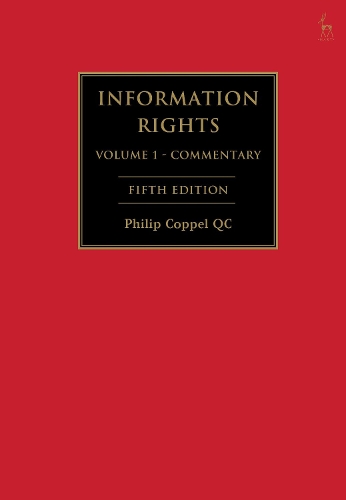
Information Rights: A Practitioner's Guide to Data Protection, Freedom of Information and other Information Rights
(, 5th edition)
Publishing Details
Information Rights: A Practitioner's Guide to Data Protection, Freedom of Information and other Information Rights
By (Author) Philip Coppel KC
Bloomsbury Publishing PLC
Hart Publishing
28th May 2020
5th edition
United Kingdom
Classifications
Professional and Scholarly
Non Fiction
342.410853
Physical Properties
Contains 2 hardbacks
Width 169mm, Height 244mm
3662g
Description
Retaining the position it has held since first publication, the fifth edition of this leading practitioner text on information law has been thoroughly re-worked to provide comprehensive coverage of the Data Protection Act 2018 and the GDPR. Information Rights has been cited by the Supreme Court, Court of Appeal and others, and is used by practitioners, judges and all those who practise in the field. The new edition maintains its style of succinct statements of principle, supported by case law, legislative provisions and statutory guidance. Reflecting its enlarged scope and to maintain easy referencing, the work has been arranged into two volumes. The first volume is a 1,250-page commentary, divided into six parts. The first part is an overview and introduction to overarching principles. The second part provides an authoritative treatment of the data protection regime. This covers all four forms of processing (general, applied, law enforcement and security services) under the GDPR and DPA 2018. Each obligation and each right is comprehensively treated, with reference to all known case-law, both domestic and EU, including those dealing with analogous provisions in the previous data protection regime. The third part provides a detailed treatment of the environmental information regime. This recognises the treaty provenance of the regime and its distinct requirements. The fourth part continues to provide the most thorough analysis available of the Freedom of Information Act and its Scottish counterpart. As with earlier editions, every tribunal and court decision has been reviewed and, where required, referenced. The fifth part considers other sources of information rights, including common law rights, local government rights and subject-specific statutory information access regimes (eg health records, court records, audit information etc). The final part deals with practice and procedure, examining appeal and regulatory processes, criminal sanctions and so forth. The second volume comprises extensive annotated statutory material, including the DPA 2018, the GDPR, FOIA, subordinate legislation, international conventions and statutory guidance. The law is stated as at 1st February 2020.
Reviews
The book is well-structured and clearly signposted, which helps the reader locate specific details without becoming unwillingly submerged in the complexities of the field. It therefore works on two levels: as a thorough map of the information rights landscape in the UK (as at February 2020) and also a methodical introduction to many sometimes arcane areas. Because of this, it is both a useful volume for the specialist and also accessible to those not steeped in the topic. Written with evident relish for the subject, this is an admirably holistic treatment of the ever-expanding, complex but never more important field of information law and the accompanying rights. -- Kate Brimsted * Law Society Gazette *
This book is an essential addition to the bookshelf of any practitioner who has to consider information rights, however often. The book is the best kind of practitioner text: practical and clear, but also scholarly, thoughtful and analytical. Philip Coppel and his team of contributors deserve both congratulation and gratitude. -- Sarah Hannett QC * Judicial Review *
For law students, and information governance professionals alike, these beautiful weighty tomes are a must-have addition to their information rights library of seminal textbooks, but they also make a supremely useful practitioners handbook. -- Lynn Wyeth, Leicester City Council * Freedom of Information *
Information Rights shines a clear and authoritative light on the laws labyrinthine structure and unfamiliar concepts With its crisp statements of principle, supported by footnoted sources, the book makes light work of a heavy topic Philip Coppel and his team of contributors deserve both congratulations and gratitude. -- Professor Sir Ross Cranston, London School of Economics * Butterworths Journal of International Banking and Financial Law *
Methodically laid out, easy to follow and contains ample references to the primary material where necessary Overall this book provides an engaging and comprehensive review of the various ways in which information rights arise and can be challenged. It is likely to be an extremely valuable resource to practitioners and academics alike in light of its detailed analysis of both the domestic and international case law. -- Laurent Sykes QC, Grays Inn Tax Chambers * British Tax Review *
Author Bio
Philip Coppel QC has practised in the area of Information Rights for over 20 years and has appeared in many of its leading cases. In this work, he has been joined by a pre-eminent practitioner for each area of expertise, with over 12 QCs from eight leading chambers.
